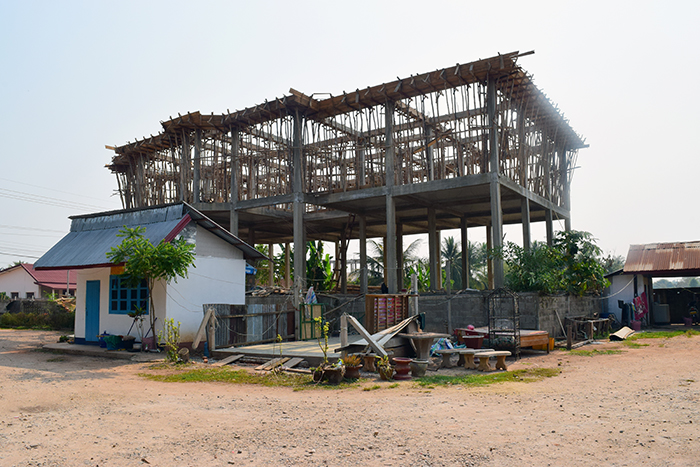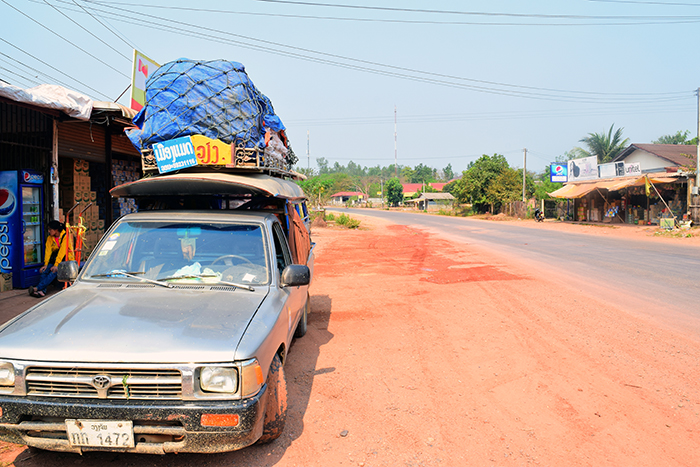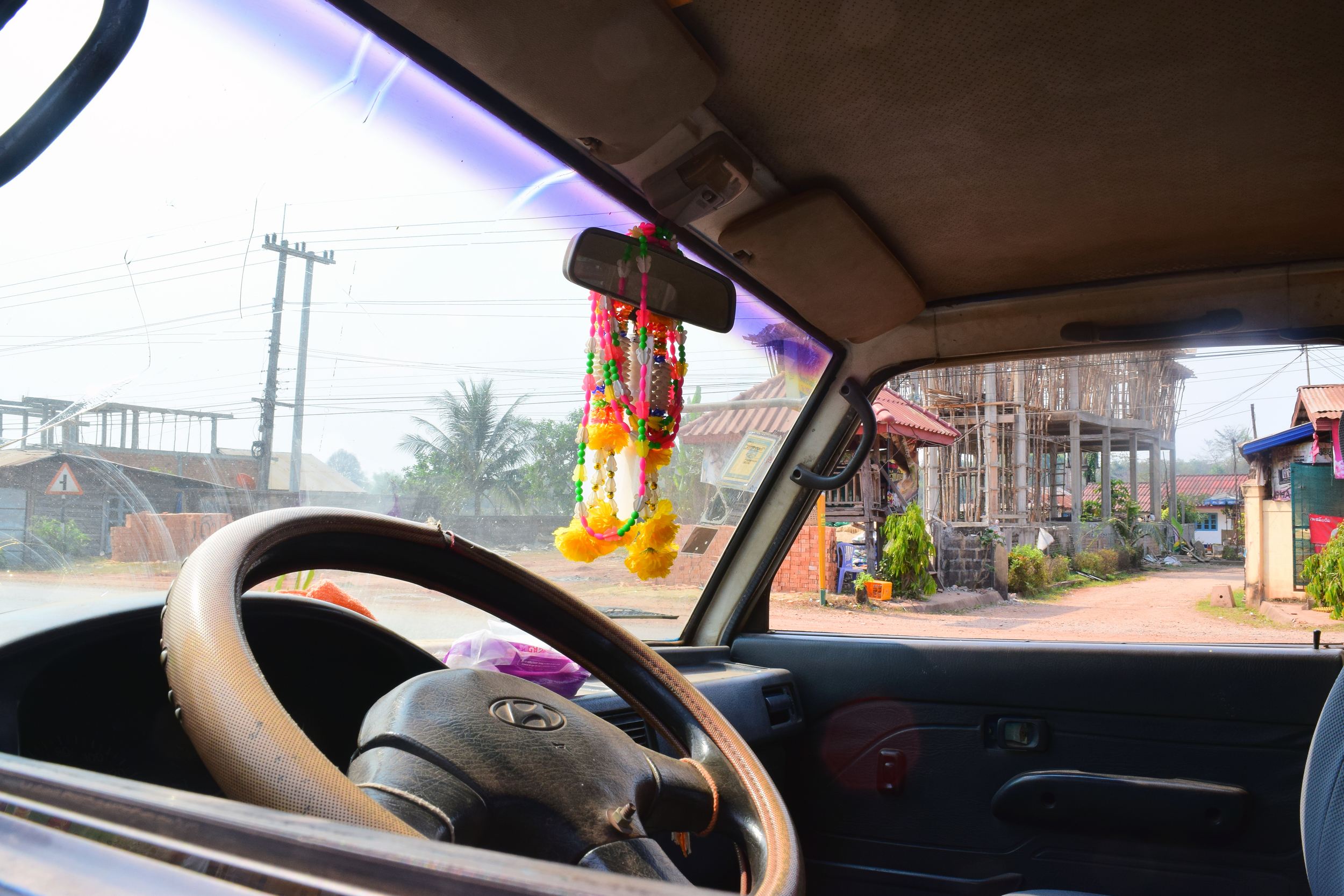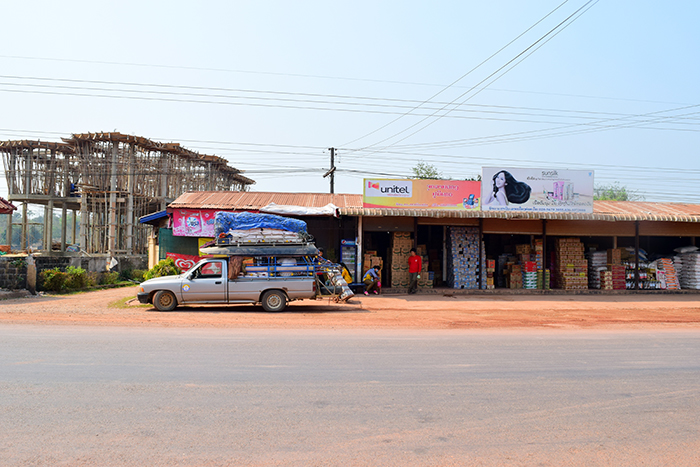




Location: Nakam, Laos
The past twenty-four hours have been a warped nightmare that I can’t wake up from. I’m living the whispered, fear-mongering story you hear about traveling abroad, the one your parents use to scare some common sense into you, the one that you shake off and tell yourself that it’s a once-in-a-million chance and that it would never happen to you. I am now a character in an indie B-grade backpacker horror flick with a nasty plot twist worthy of a Hollywood adaptation.
So cheers, folks. The Motorbike Chronicles continue.
I hadn’t slept well in the no-mattress-just-springs bed at Somchai Guesthouse. Cody had laid awake moaning most of the night, unable to find a comfortable position with all of his wounds. And, unable to shake my swirling recollections of the day, I’d spent the early hours of dawn writing. So I was groggy when I was awakened at nine o’clock by the shrill howl of the alarm, three hours earlier than my usual internal clock is set. My arm stung when I unwrapped the bandages. My knees throbbed. Bruises were forming over both, black and blue knots where my joints once were. I clipped the dangling chunk of skin off my thumb with a pair of scissors, and I muffled another round of sobs when the shower water hit the still-bleeding gash on my arm. I was horrified that blood had soaked through the bandages the night before and still continued to trickle out. Maybe I needed stitches after all.
I woke up the others about a half hour later. Everyone was tired, hungry, and thirsty. We hadn’t eaten since yesterday morning, didn’t even have any drinking water to settle our stomachs. It was a slow process moving everyone out of the guesthouse and over to the open-front minimart across the road. Cody went looking for snacks to munch on as we hitchhiked back into Vientiane. I called out to him to find me some crackers; just something to fill myself up for the ride.
Baby was preparing for his day’s ride back to Vientiane. He retied the laces of the Converses he’d borrowed from Cody and pulled up his drooping black socks. He had a few kilometers to walk before he would make it back to where we’d parked the bikes the night before, a couple villages over. He was quiet and I interpreted it as a combination of tiredness, hunger, and nervousness; I didn’t know how I felt about him riding alone back to Vientiane, but he was pretty comfortable on the bike and would be much faster without a second passenger.
Jack came back from the minimart’s fridge with two bottles of water, handed over money to the cashier, (it turned out the minimart was also owned by the same little lady as Somchai Guesthouse and she waved at me from behind her desk) took a swig, and passed the open one to me. I chugged it, savoring the way the cool liquid soaked into my parched throat, soothing it.
I stood by the bags, taking in the scenery, or lack thereof. There was what looked like a warehouse across from us, which was stacked high with colorful, plastic-coated boxes of soda cans, rice bags, beer cartons, and more. Other than Somchai, there didn’t seem to be any buildings around besides half-abandoned construction sites and small family homes. And beyond that was just fields and mountains. All civilization was focused on the slender stretch of highway that cut across these lands: a single, conspicuous charcoal line in the landscape like a Barnett Newman painting: flat planes of red dirt and green vegetation. The morning was silent except for the chatter of a few customers milling about in the minimart and the occasional rumble and creak of a passing vehicle, each stirring up a thick dust cloud as they passed. Right now, the highway was empty except for a few trucks headed toward Vientiane and a single red motorbike zooming up toward Nakam, trailing grit.
“I’m going to the toilet quick. Be right back and then let’s get going?” Jack said.
“Cool beans,” I said and he turned to cross the street back to Somchai. I screwed the lid back onto the water bottle and was leaning down to put it on the ground when I heard the screech and bang.
I whipped around, just in time to watch the faded red motorbike swerve out of control past me and the rider thrown forcefully into the air. He flipped forward in an almost graceful loop, his eyes closed serenely and his body completely lax, and then fell hard onto the ground, hitting face first against the asphalt. Then nothing. He lay completely still. I looked back and saw Jack laying on his back in the street. He tried to prop himself up on his elbows and fell back down flat, groaning. I let go of the bottle and barely heard the sound of the plastic bouncing and rolling off the cement platform.
The biker still hadn’t moved. I took half a step toward him and saw blood was beginning to pool around his jaw and neck. I stopped, paralyzed with fear. Baby and Cody were running toward him. So were several other men from the minimart. They quickly surrounded him so I ran over to Jack, falling to my knees beside him.
“Are you okay?”
“Yeah. I…What? I was just looking out and what…” He tried to sit up again and was able to make it without falling back. I half-helped him stand, then dragged him out of the road, to the edge of the minimart platform beside our backpacks.
“Are you sure you’re okay?” He was a bit cut up on his arm and shoulder and his pants were ripped, but I couldn’t see any serious injuries. I was also more worried about internal ones. He was breathing heavily and curling up his body.
“Yeah, ah, my stomach hurts. Fuck. The other guy. How’s the biker?“
I glanced back at the other guy. His face was still flat against the pavement. Everyone was just kind of staring at him, unsure what to do.
“He’s uh,”
Dead, he’s dead.
“Here, have some water. Please. Drink this.” I unscrewed the cap of the bottle and gave it to Jack, crouching in front of him, trying to block his view of the frighteningly silent scene. My heart was pounding and my thoughts were coming too fast to stop them, to tame them into reason.
If he’s dead-no. But if he is. Did I just see someone die? No. His family. He probably has a family. He was just driving and then… What happens if you kill someone in Laos? No.
Jack craned his neck to peer over my shoulder. And the water he’d drank immediately came back up, spilling across the cement and dirt. He sat there heaving, staring at the puddle in front of him. I couldn’t tell if he was puking or hyperventilating. I just rubbed a hand across his shivering back.
Please let him not be dead.
In the middle of the road the blood pool was spreading: an ominous, thick dark stain on the asphalt. It was beginning to soak into the collar of the man’s camouflage windbreaker. I noticed one of his black work shoes had flown off. He was wearing a navy sock underneath. He still wasn’t moving.
Oh, God. He’s dead. He’s dead.
Cody and Baby helped several men flip the body over. Immediately, though, the men tried to sit him up. Someone shook him, as if that would resuscitate a corpse. Cody looked at me in a panic. I ran over, leaving Jack on the ground.
“What do I do? No one here knows any first aid! They can’t move him! They keep tilting his head up and pouring water down his throat, and it’s just sitting in his mouth blocking his airway when he’s not even breathing. If he’s… What do I do? Nobody can tell what I’m saying!” Cody said.
“Just help him! You know first aid, you did the EMT class!” I said, also panicking. I had no idea what to do in this kind of situation. I learned CPR when I was twelve…but that was it. I imagined myself giving a very poor, gory version of mouth-to-mouth to this man, both of us choking on his blood, and knew I couldn’t help. I felt useless. Cody ran back to the man, bent down over him.
“He’s breathing!” Cody shouted. I felt a shiver run through my whole body. Thank God. Thank fucking God.
I ran back to Jack, who was now being tended to by Baby.
“He’s breathing, Jack.” I said. I didn’t know how reassuring that could be though, because it was obvious the man was still unconscious. He was now just lying in the middle of the road on his back, his bike on its side beside him. I couldn’t tell how much of his face was injured for the mess of blood covering all of his features. His bottom lip was hanging off nearly entirely, and there was blood dripping down from his mouth, trickling in a syrupy river through his teeth. Four men picked him up, each by the end of a limb, and began to carry him to the side of the road. The biker’s head flopped loosely at the end of his neck. Cody leapt in and supported his head. One man carried the rider’s black pleather briefcase, which had blood and dirt stuck to it.
Once they’d reached the side of the road and placed his body on the ground, a young girl came out with smelling salts and a glass of water. Another man grabbed a piece of cardboard. They picked the biker back up, put him on the cardboard, and placed the salts under his nose. The man’s eyes opened, blinking back blood, and he moved slowly, like a bear first waking up from hibernation. His head twisted left, right, and his eyes were glassy with drowsiness and confusion. He lifted his right, gloved fingers to his now misplaced lip and touched it gingerly. It seemed like he couldn’t really feel anything; he moved his lip back to where it should be. Blood continued to drizzle down his face and another man helped him sit up.
“No, no! He needs to keep still,” I could hear Cody saying.
It didn’t seem like anybody was actually doing anything to help the man with his wounds, protect him from infection, or even talk to him. Most people were just staring at him while he looked around, dazed and bewildered. His bike was still in the road, and that didn’t seem to concern him. Does he remember anything that happened?
I ran to the lady from Somchai. “Hospital?” I asked. She shook her head.
“Hospital?” I asked a man in the minimart. Nothing, again. I could hear Cody repeating it as well. I Google-translated it on my phone.
“Ohngmo,” I said over and over to everyone who would listen, probably butchering the pronunciation entirely. Everyone shook their heads. Was there just no hospital here? We couldn’t take the man anywhere. Our only mode of transportation was a five kilometer walk away! Cody asked for my phone so he could translate questions to the man, the standard ‘do you know what your name is, where you are, etc.’ I wasn’t sure how he was going to figure out the man’s answers.
Jack had fallen backwards on the cement and was holding his side tenderly. Baby’s eyes were glued to the gory scene.
“Baby!” I snapped. “Make sure Jack doesn’t fall asleep. Jack, stay the fuck awake, okay? If you feel sleepy, sit up. You have to. And seriously, what happened? How did you get hit?”
“Yeah, I was looking out to cross and then I was thrown back…” Jack groaned out.
“Where did you get hit? What part of your body? You need to show me.”
Baby helped Jack sit up and he lifted his shirt. There was a bruise in the form of a straight line across his side, the same height and width of the bike’s basket.
“My shoulder hurts too. And some of my thigh. And my ass. But mostly my stomach. It really hurts. And I feel nauseous.”
Medical information spun around in my head. Where’s the spleen? Is that the stomach there? The kidney? How can I tell if he has serious internal bleeding? Nausea is really, really bad, right?
“You need to go to the hospital.”
“No, no. I’m fine. Seriously. I don’t need to go to the hospital. Just give me some painkillers.” Jack said, referring to the unnecessarily massive supply of Panadol that I’d received the day before from the little countryside hospital.
“That’ll just mask your symptoms if you’re seriously injured.” I said.
Cody came running over. He was sweating and his eyes were big and round with fear. “They keep sitting him up! They can’t do that. He needs to stay lying down! They can’t tell what I’m saying. He knows who he is though and where he is. I just don’t have any supplies. They don’t even have gauze here, or a spinal board, or even alcohol so I can clean his lip.”
The iodine! I grabbed the little yellow squeeze bottle out of my backpack and handed it to Cody and he went to see if they had cotton balls at the minimart. All of the locals seemed to have lost interest in the scene; we were the only ones still paying the man any attention. Baby handed him some more water as Cody cleaned his wounds. I sat beside Jack, who was now breathing normally but not quite up to having a conversation yet.
Jack’s black-and-white hat with its denim brim and the biker’s blue and black helmet were only a couple yards away from each other on the road. I stood up and walked over to them, picked them up. The helmet was missing a thick slice of plastic from the front visor. That must have been what cut his lip. The rider was middle aged, stout, and wearing full protective gear unlike most Laotian motorbike riders. (I’d seen pairs of nine year olds without helmets riding down the highway before.) How had he lost his helmet, the most important piece of gear? The only part of him that seemed hurt was his head and face. I hadn’t seen the helmet on him when he was flying through the air. It must have come off in the initial impact, meaning it wasn’t properly hooked on or something.
I went over to the rider’s bike, picked it up and pulled it off the road. Several containers of jelly had spilled out of the basket. I placed them back in it. It looked like he’d been grocery shopping that morning, was just headed home from errands. That thought curled my stomach.
We’d been sitting around after the accident for about thirty minutes now, just wondering if anyone else was going to do anything to help the guy. We couldn’t leave him; it felt wrong, as if we were fleeing the scene. Baby headed off to grab his bike, assuming he’d see us soon either still here at the minimart or back in Vientiane. Cody was now looking over Jack’s wounds as well, and I cleaned the cuts out with water and sanitized them with iodine. I placed a single, sticky bandaid over the one on his shoulder. It was the only one that needed it.
A young policeman with a thick mop of black hair, a friendly smile, and the beginnings of a pot-belly rode up on a motorbike. His green uniform looked freshly pressed, but he was still sweating under all that polyester in the heat. Droplets trickled down his forehead. He began to ask us questions. At first he saw Cody’s and my wounds and assumed we were the ones that had been hit by the bike. He spoke barely any English, but enough to get across several questions about what had happened. And he waved down an open truck with several men in military uniforms to take the man to the hospital.
We explained the situation, that Jack had been hit, where the initial impact had happened, and where the man and bike had landed. Several more policemen in beige uniforms appeared with a tape measure and white spray paint and they began to mark out the accident on the road. They drew a diagram of it all on a piece of graph paper in a ledger.
Jack was led to the only full wooden table by the policemen and they asked him all the basic questions; name, age, occupation, nationality, where he was staying in Laos, why he was in Laos. There were now five police milling about, but only the man in green spoke any English. They were all writing things down in blue pen on the graph paper, but the symbols were complete gibberish to me.
A tall, gaunt cop, the least friendly of the bunch, asked for our passports gruffly. I wasn’t sure why they needed mine or Cody’s, but we handed them over. The cop in green asked us the same questions he’d asked Jack as his colleague copied down our passport numbers. We stood there for a long time, answering those same questions over and over.
Name? “Cassia.”
Age? “Twenty-three.”
Occupation? “Journalist.”
Nationality? “USA.”
And repeat. Just sweating in the heat. I wondered how the biker was doing; I could still see his blood puddle drying into the road. The cops sat with Jack at the table for a while. One of them made fun of his full beard.
I wandered back over to our backpacks and sat beside them, stretching my legs out. How long would we be here? One policeman followed Cody around the scene for the -nth time as he recollected everything again, scribbling down more notes in his notebook. Cody had been in the store when it all happened; he was just pointing out measurements on the road. Where Jack landed. Where the bike landed. Where the rider landed.
The cop in green appeared beside me, smiling, and sat down on the cement with me.
“Hello, your name?”
“Cassia.” He’d asked me this so many times, but I smiled anyway. His colleagues had my passport; I wasn’t going to piss him off. He told me his name.
“How old?”
“Twenty-three. You?”
He held up his fingers. Twenty-four. “I learn English now seven months.” He said.
“It’s really good!” He grinned at that, scooted closer to me on the ground.
“Are you married?”
“No. But boyfriend.” I pointed at Cody.
“Very beautiful,” he said. He looked me up and down in a way that made me hug my knees to my chest.
“Ah, thanks…” I said. Is he really doing this? At the scene of a nearly-fatal motor accident? Is he really hitting on me right now under these circumstances?
“How many in your family?”
“Um, like, five? Mom, dad, sister, brother, and me.” I held up a finger for each person as I named them off. He nodded; apparently that was a good answer. He looked at me expectantly.
“And um, yours?”
“Four. Mom, dad, sister, me.” He counted them off on his fingers as well.
Cody came over then. I think he could sense my discomfort from ten yards away.
“Very strong! Good!” The cop said, pointing at Cody and nodding at me. I nodded too, let out an awkward chuckle, and the cop got up, dusted off his uniform, and walked back to his colleagues and Jack. After a moment, they called Cody over and made him and Jack sign and date something handwritten in Lao. It looked like some sort of witness statement. Then Cody and I went back to our backpacks.
“What’s going on?”
“I don’t know.”
We sat there for a bit longer before I heard Jack’s voice raising at the table.
“Can I have my passport?” He was saying, loudly, almost panicky. A pause. I could see the back of the policeman shaking his head.
“Why can’t I have my passport?” More head shaking. “Wait, where is he going? Why is he taking my passport?” A cop got on the injured biker’s motorbike and rode off down the highway.
Cody and I ran over. We did not want to anger these cops; I didn’t know what powers the cops had in Lao.
“Ah, where is he going?” I asked the English speaker.
“The police station. It’s okay! Do not worry!” He smiled.
“Well, can we have our passports back?” I asked, suddenly very aware that my passport was in the hands of the gaunt cop, who was glaring at me. I couldn’t tell if it was his resting face or if I’d pissed him off by existing.
“No, no. We all go to police station. Next village.” The cop in green told me, still smiling.
“Uh, okay.” I said. There wasn’t much else to say. Cody, Jack, and I followed three policemen into a plain gray van and sat in silence as we rode to the station in the next village, passing nothing but open faced huts, curious faces, and green land between.